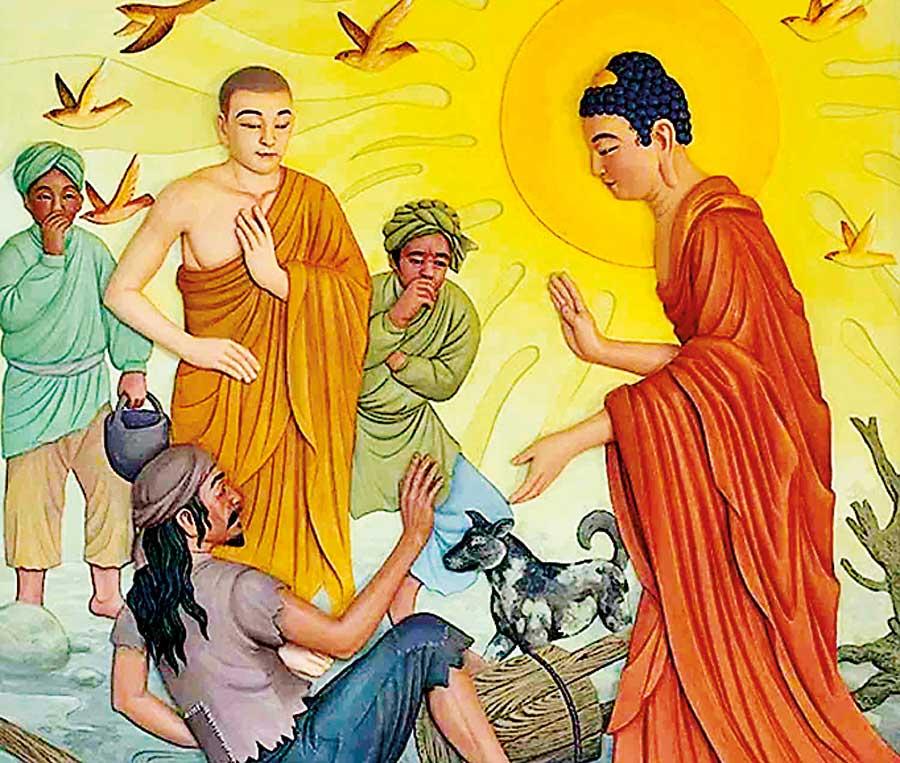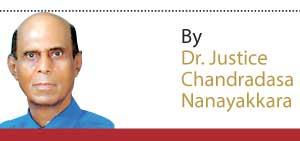29 Sep 2023 - {{hitsCtrl.values.hits}}

Buddha comes across the “untouchable” carrying excrement. Buddha treats the “untouchable” as an equal, without pride, and asks him to become one of his monks.
Image courtesy - Buddha Weekly
In Buddhism, the word “mana” (Pali) connotes the idea of pride, arrogance, vanity, or conceit etc. Although these words are used synonymously and interchangeably, subtle differences in meaning are to be found between these words. Pride is defined as an inflated state of mind arising out of such things as accomplishments, wealth, knowledge, fame, etc. People tend to evaluate their abilities, qualities, and other achievements by comparing them with those of others. This attitude of comparing one’s achievements and other characteristics tends to evoke pride in people.
differences in meaning are to be found between these words. Pride is defined as an inflated state of mind arising out of such things as accomplishments, wealth, knowledge, fame, etc. People tend to evaluate their abilities, qualities, and other achievements by comparing them with those of others. This attitude of comparing one’s achievements and other characteristics tends to evoke pride in people.
According to Buddhism, these comparisons with others can take one of three forms. (a) thinking I am superior to others (seyya mana) (b) thinking I am equal or as good as others. (sadisa mana), (c) thinking I am inferior to others (hina mana). Pride is an extremely powerful latent tendency that is difficult to overcome and can exist even in those who have attained all the first three stages of enlightenment that is sotapanna, anāgāmi, and sakadagami. It is only on attaining Arahatship that the last vestige of the fetter of pride (mana samyojana) can be eliminated.
When pride arises in a person, he sees others having lower qualities, less possessions, less fame, accomplishments, etc. Pride can propel a person to dizzying heights, or tear him apart. It is one of the ten unwholesome mental factors that shackles a person to samsara and an endless cycle of suffering (vissudimagga).
Pride is so deceptive that people are often oblivious to it. It can inconspicuously and insidiously seep into our thinking until we are completely absorbed in it ourselves. As an extremely latent tendency, pride lies dormant until it comes in contact with the five sense objects. Pride as an unwholesome emotion is considered an obstacle to spiritual growth in every religion, and it is something that Buddhists should strive to avoid.
Pride stems from attachment, which is one of the greatest sources of suffering. Pride pervades all orders of society, from the highest to the lowest. Prideful people’s yearning for validation and recognition is so pronounced in our society that they try to get a sense of self-worth by promoting themselves on social media platforms and posting their pictures, awards, and other accomplishments. Their main objective is to boost their egocentrism and show the world that others cannot measure up to their achievements. Prideful people generally do not acknowledge pride in themselves but are quick to recognise and condemn pride in others.
Pride clouds the mind and manifests in unwholesome thoughts and actions. According to Dhammapada. “we are the result of what we have thought. It is founded on our thoughts. It is made up of our thoughts. If one speaks or acts with an evil thought, pain follows one, as the wheel follows the foot of the ox that draws the wagon”.
In Buddhism, pride has been compared to a fragile bamboo bridge. (Yo manam udabbadhi asesam nalasetum va sudubbalam mahogho so bhikku jahati or aparam urago jinnam iva tacam puranam). He entirely blots out conceit as the flood demolishes a fragile bamboo bridge. – such man gives up here and beyond, just as a serpent sheds its worn-out skin. Human pride is just as fragile and shaky. Pride may easily be upset by a whiff of public opinion, hurt by any fool’s snide remark, or hurled down deep by defeat, failure, or misfortune. (nyanaponika)
No human demeanour is more open to contempt and criticism than pride. Pride arises from an egocentric evaluation of oneself in relation to others. Whenever pride arises in a person, it deludes his mind and fails to see things as they truly are.
Beneath every manifestation of pride lies self-esteem. It is the conviction of superiority over others. It is the feeling that we are what they are not, or that we can do what others can’t do. Success in early childhood may sow the seeds of it. The praise of relatives fosters it. Once planted, it grows. (Brian Fawcett). Over time, you develop the habit of comparing yourself with others. But it is important to remember that no human being deserves any more or less respect than another regardless of title, wealth, fame, etc.
Pride can also serve a positive, productive purpose, but it has a dark, destructive side too. There is nothing wrong with feeling satisfaction when a person achieves some goal in life such as being successful at a competitive exam, when promoted to a higher echelon in one’s field of work, or when he is praised for some work or mental quality. In this instance, pride is considered wholesome as it is aligned with his own merits. Praise within limits, from a knowledgeable person can be stimulating and encouraging as it motivates him to a higher level, but if it stimulates his ego and allows his accomplishments to define who he is, it is something to be deplored. In these situations, claiming pride beyond what is deserved can easily develop into arrogance or becoming self-centred. Even if one were to achieve success in some field of activity, there is no reason whatsoever to feel conceited and arrogant. Moreover, pride in a positive sense helps a person to behave in moral, socially appropriate ways in their social interactions. However, it is important to bear in mind that success in a given field is likely to breed pride and arrogance, and failure to do so may breed pessimism and depression.
They say pride goes before destruction. Pride and arrogance are obvious in many political leaders and people in leadership positions. Proud leaders become immune to their deficiencies and weaknesses. They present themselves as flawless and impeccable. When people in leadership positions are consumed excessively by pride, widespread suffering could ensue. Pride in a leader can also be the cause of misery in a nation.
Pride in a general sense relates more to our opinion of ourselves, on the other hand, vanity to what we would have others think of us. Vanity is self-absorption in one’s appearance, qualities, accomplishments, etc. is sometimes referred to as narcissism. This infatuation based on attachment to one’s self-image is identified as Mada (Sanskrit) in Mahayana teaching.
Self-absorbed people believe that their looks and appearance will remain the same and carry them through life. Today, people particularly women who are steeped in vanity spend an enormous amount of money on grooming products such as anti-ageing creams, lotions, etc., to enhance their beauty. They also resort to other procedures such as facelifts and plastic surgery to counteract their age. Vanity is detrimental not just to the person displaying it, but also to those around them. It is considered a hindrance for both Buddhists and people who belong to other religions, as it is decried by every religion. Vanity is a delusion that compromises sanity. For a person caught up in vanity, throwing off the chains of attachment would be difficult.
Buddhism teaches that the world and everything in it are illusory and impermanent, even the very looks and appearance over which people obsess are subject to the same law of impermanence and eventually wither and fade. It takes persons with tremendous abilities to do away with vanity when it is ingrained in them. Self-absorbed people tend to pay attention to other people’s shortcomings and weaknesses rather than their own. They usually fail to notice how much their actions hurt the people around them.
An antidote to pride is humility or modesty, which is a forgotten quality of the contemporary world. Today, the virtues of modesty are becoming lost in our world, as immodesty is becoming widespread. At the same time, moral purity and values are on the decline. People are losing sight of the importance of modesty and the significance it should hold in their lives. A modest person does not boast of his own merits or achievements. He would rather feel embarrassed if anyone eulogizes him in his presence, never exalt himself and becomes prideful when others compliment him.
Most people associate humility with a lack of self-esteem and a lack of confidence in one’s abilities. Humility is a quality found in a wise person with many qualities. They say when the tree is loaded with fruit, its branch bends towards the ground. Similarly, a modest person is always attentive to people and never poses as an important person. By being humble, we do not denigrate ourselves and jettison our self-esteem. As a legendary British writer, C.S. Lewis aptly says, “True humility is not thinking less of yourself but thinking of yourself less”.
In Mahayana Buddhism, humility is one of the precepts. It is a wholesome state of mind in which we focus on our positive qualities and accomplishments to justify a sense of superiority and not look down on others. Humility forbids ascribing to ourselves greater worth than we possess.
Pride can affect even people who lead a spiritual and religious life. Any pride that arises in connection with the practice of Dhamma is also deplored in Buddhism. It is called spiritual pride.
09 Jan 2025 29 minute ago
09 Jan 2025 34 minute ago
09 Jan 2025 51 minute ago
09 Jan 2025 1 hours ago
09 Jan 2025 1 hours ago